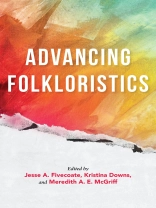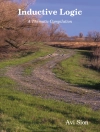An unprecedented number of folklorists are addressing issues of class, race, gender, and sexuality in academic and public spaces in the US, raising the question: How can folklorists contribute to these contemporary political affairs? Since the nature of folkloristics transcends binaries, can it help others develop critical personal narratives?
Advancing Folkloristics covers topics such as queer, feminist, and postcolonial scholarship in folkloristics. Contributors investigate how to apply folkloristic approaches in nonfolklore classrooms, how to maintain a folklorist identity without a ‘folklorist’ job title, and how to use folkloristic knowledge to interact with others outside of the discipline. The chapters, which range from theoretical reorientations to personal experiences of folklore work, all demonstrate the kinds of work folklorists are well-suited to and promote the areas in which folkloristics is poised to expand and excel.
Advancing Folkloristics presents a clear picture of folklore studies today and articulates how it must adapt in the future.
Table des matières
Foreword: Challenges and Possibilities across Boundaries, by Margaret A. Mills
Acknowledgments
Envisioning a Future Folkloristics, by Jesse A. Fivecoate, Kristina Downs, and Meredith A. E. Mc Griff
1. Deep Folklore/Queer Folkloristics, by Kay Turner
2. ‘An Epidemic of Meanings’: The Tenuous Nature of Public Intellectualism, Reflexivity, and Belief Scholarship, by Andrea Kitta
3. Expanding the Territory, by Jeanmarie Rouhier-Willoughby
4. The Politics of Trivialization, by Jesse A. Fivecoate, Kristina Downs, and Meredith A. E. Mc Griff
5. The Folklorization of Queer Theory: Public Spaces, Pride, and Gay Neoliberalism, by Cory W. Thorne and Guillermo De Los Reyes
6. Yemayá’s Fury: Residual Flows, Ecological Disaster, and Folklore Futures, by Solimar Otero
7. Infusing Public Folklore Work into Academe: Experiencing the In-Between, by Gregory Hansen
8. Folklorists as Curators: Exploring the Four Cs, by Betty J. Belanus
9. Culturally Conscious Collaborations at the Nexus of Folklore, Education, and Social Justice: Lessons and Questions for Folkloristic Praxis, by Phyllis M. May-Machunda
10. The Power of Folkloristics at the Intersection of Affect, Narrative, and Performance in the College Classroom, by Anthony Guest-Scott
11. The Folkloristic Diaspora: On Being a Folklorist in a Black Studies Department, by Anika Wilson
12. Standing with Others: Folklorists in the Midst of Home, by Wanda G. Addison
13. Disruptive Folklore, Debra Lattanzi Shutika
14. Talking Folklore: Getting Others to Take the Discipline Seriously while Remaining a Serious Folklorist, by Andrea Kitta, Lynne S. Mc Neill, and Trevor J. Blank
Afterword: Advancing Folkloristics, by Norma E. Cantú
Index
A propos de l’auteur
Jesse A. Fivecoate is a doctoral candidate in folklore at Indiana University, Bloomington. In 2018, he received the Dorson Dissertation Prize from the Department of Folklore and Ethnomusicology. Kristina Downs is Managing Editor of the Journal of Folklore Research. She is also creator and host of the Crimelore podcast. Meredith A. E. Mc Griff is Membership Director of the American Folklore Society and co-founder of Hoosier Films. She is author of The Michiana Potters: Art, Community, and Collaboration in the Midwest.












